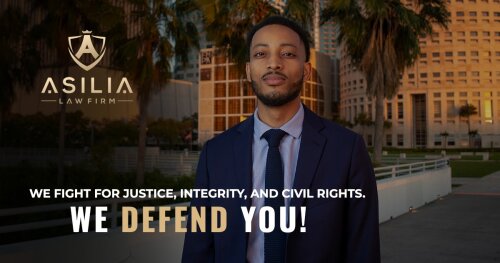Best Arrests & Searches Lawyers in Miami
Share your needs with us, get contacted by law firms.
Free. Takes 2 min.
List of the best lawyers in Miami, United States
About Arrests & Searches Law in Miami, United States
Arrests and searches in Miami, United States are governed by both federal and state laws. When a person is arrested, their constitutional rights come into play, including the Fourth Amendment protections against unreasonable searches and seizures. It's essential to understand your rights if you find yourself in a situation involving law enforcement in Miami.
Why You May Need a Lawyer
There are various situations where you may need a lawyer in Arrests & Searches cases in Miami. This includes facing criminal charges, being subjected to an unlawful search, or having your rights violated during an arrest. A lawyer can ensure that your rights are protected and guide you through the legal process.
Local Laws Overview
In Miami, law enforcement must follow specific procedures when making an arrest or conducting a search. For example, police officers must have probable cause to make an arrest or obtain a search warrant to conduct a search in most cases. It's essential to be aware of your rights and the laws that apply to Arrests & Searches in Miami.
Frequently Asked Questions
Q: Can the police arrest me without a warrant?
A: In certain situations, the police can make an arrest without a warrant if they have probable cause to believe a crime has been committed.
Q: What should I do if the police want to search my property?
A: You have the right to refuse a search of your property without a warrant. It's essential to assert your rights calmly and respectfully.
Q: What should I do if I'm arrested in Miami?
A: If you are arrested in Miami, it's crucial to remain silent and contact a lawyer as soon as possible. Your attorney can advise you on the best course of action.
Q: Can I sue the police for a wrongful arrest or search?
A: If your rights were violated during an arrest or search, you may have grounds for a lawsuit against the police. Consult with a lawyer to discuss your options.
Q: What is the difference between an arrest and a detention?
A: An arrest involves taking a person into custody, while a detention is a brief stop by law enforcement for questioning.
Q: Can the police search my vehicle during a traffic stop?
A: Police can search your vehicle during a traffic stop if they have probable cause to believe there is evidence of a crime inside.
Q: What are Miranda rights, and when do they apply?
A: Miranda rights are the rights that must be read to a person before any custodial interrogation. They apply when a person is in police custody and being questioned.
Q: How long can the police detain me without charging me?
A: In most cases, the police can detain you for a brief period for questioning. If you are not charged within a reasonable time, you must be released.
Q: Can I refuse to take a breathalyzer test during a DUI stop?
A: Refusing to take a breathalyzer test during a DUI stop can have legal consequences, such as license suspension. It's essential to understand the implications of refusing a test.
Q: What should I do if I believe my rights were violated during an arrest or search?
A: If you believe your rights were violated, document the incident as much as possible and contact a lawyer to discuss your options for legal recourse.
Additional Resources
If you need legal assistance in Arrests & Searches cases in Miami, consider contacting the Miami-Dade County Bar Association or the American Civil Liberties Union (ACLU) of Florida for guidance and support.
Next Steps
If you find yourself in need of legal assistance regarding Arrests & Searches in Miami, don't hesitate to reach out to a qualified attorney who specializes in criminal defense. They can help protect your rights and navigate the legal process on your behalf.
Lawzana helps you find the best lawyers and law firms in Miami through a curated and pre-screened list of qualified legal professionals. Our platform offers rankings and detailed profiles of attorneys and law firms, allowing you to compare based on practice areas, including Arrests & Searches, experience, and client feedback.
Each profile includes a description of the firm's areas of practice, client reviews, team members and partners, year of establishment, spoken languages, office locations, contact information, social media presence, and any published articles or resources. Most firms on our platform speak English and are experienced in both local and international legal matters.
Get a quote from top-rated law firms in Miami, United States — quickly, securely, and without unnecessary hassle.
Disclaimer:
The information provided on this page is for general informational purposes only and does not constitute legal advice. While we strive to ensure the accuracy and relevance of the content, legal information may change over time, and interpretations of the law can vary. You should always consult with a qualified legal professional for advice specific to your situation.
We disclaim all liability for actions taken or not taken based on the content of this page. If you believe any information is incorrect or outdated, please contact us, and we will review and update it where appropriate.









